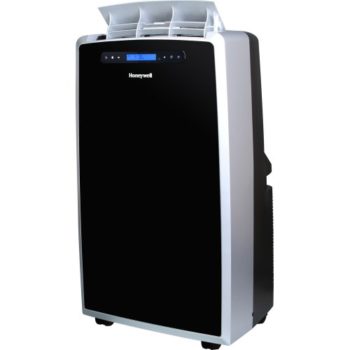I’d love to spend my free summer days fixing a classic car in my garage. But living in Florida, my garage quickly becomes unbearable during the hot summer days.
I started looking into different ways of cooling down my garage. One of the first things to come to mind was a portable air conditioner.
Can you cool a garage with a portable air conditioner? Yes. A 7,000 BTU air conditioner should be enough to cool a 1-car garage, while a 2-car garage would need a 12,000 BTU air conditioner. However, sufficient insulation is essential, so the cold air doesn’t escape.
While digging into this, I found a few things that surprised me.
I’ll get into those in a bit, but first, let’s talk about why it’s so hard to keep your garage cool in the summer.

Why Is It So Hard To Cool A Garage?
Garages are usually the most exposed room in your house, with lots of empty space and typically no insulation. If you don’t have adequate insulation in your garage, any cooling you do will just leak outside.
But it gets worse.
In addition to non-insulated walls, most garage doors have minimal (if any) insulation.
That makes them the largest non-insulated surface in your home.
Once the garage door heats up, that heat radiates heat into your garage. Then, it transfers the heat through the ceiling, walls, and garage entry door to the interior of your home.
Depending on its construction materials and location, the temperature inside your garage can be 10°F to 18°F (5°C to 10°C) higher than outside!
That, along with limited air circulation, can sometimes make the garage unbearably hot.
Problems With Using Portable Air Conditioners In Your Garage
There are other problems with using portable air conditioners in your garage.
An air conditioner works by bringing warm air in through an inlet valve, cooling it down, and sending it into your room. The warm exhaust air is then kicked back outside, and the process starts over.
For more details, I really recommend this video from Technology Connections. Nobody will ever say that digging into how portable air conditioners work is exciting, but he at least makes it interesting.
The point I want to make is that the exhaust air needs to go somewhere.
If your garage doesn’t have a window or a vent to connect the air conditioner, that air will go right back into your garage.
That may actually increase your garage’s temperature instead of lowering it.
Finally, as I said before, if your garage isn’t insulated, all that cool air will bleed through to the outside.
That said, in some cases, a portable air conditioner can be the right solution.
It just takes a little knowledge to pick the right one.
How to Choose the Best Portable Air Conditioner For Your Garage
Garages come in all different shapes and sizes. The bigger your garage, the stronger the air conditioner you need.
Before shopping for a portable AC unit, you need to figure out what size you need.

What is a BTU?
That means you need to understand what a BTU is.
BTUs, or British Thermal Units, are an internationally used unit of measure for energy.
One BTU is the quantity of heat required to raise the temperature of 1 pound of water 1 degree Fahrenheit at a specified temperature.
However, air conditioners use a different definition. Manufacturers like to keep you on your toes.
When you see BTUs listed on an air conditioner, it’s instead referring to the amount of heat the device can dissipate in one hour from a determined room.
That means you’ll need a different BTU rating depending on the room size you’re trying to cool down. Remember that a higher BTU rating will almost always mean a larger, heavier, and more expensive air conditioner unit.
How Many BTUs Do You Need To Cool Your Garage?
Most portable AC units range in strength from 8,000 to 25,000 BTUs, and I recommend buying a unit with at least 12,000 BTUs for most two-car garages.
This chart from EnergyStar.gov, shows the minimum number of BTUs you would need to cool your room.
| Area To Be Cooled (square feet) | Capacity Needed (BTUs per hour) |
|---|---|
| 100 up to 150 | 5,000 |
| 150 up to 250 | 6,000 |
| 250 up to 300 | 7,000 |
| 300 up to 350 | 8,000 |
| 350 up to 400 | 9,000 |
| 400 up to 450 | 10,000 |
| 450 up to 550 | 12,000 |
| 550 up to 700 | 14,000 |
| 700 up to 1,000 | 18,000 |
| 1,000 up to 1,200 | 21,000 |
| 1,200 up to 1,400 | 23,000 |
| 1,400 up to 1,500 | 24,000 |
Now keep in mind that this chart assumes a well-insulated room.
Unless you have insulation in your garage, you should bump up to a higher BTU output air conditioner.
Other ‘Cool’ Features
Aside from the strength, there are a couple of other factors to consider when shopping for a portable air conditioner for your garage. Here are a few of the most important ones:
- Size – Your garage is probably cramped as it is. All other things being equal, look for the unit that takes up the least amount of space possible.
- Timers or Remote Controls – The temperature of your garage will change throughout the day. A unit with a timer can let you set the air conditioner to cool down your garage at the same time every day. Similarly, a unit with a remote control can let you manually turn on the AC before you start working.
- Mobility – Air Conditioners aren’t light. If you plan on working on different projects in your garage, ensure that your unit has wheels.
- Dehumidifier – I’m a big fan of garage dehumidifiers. If you can buy a portable air conditioner with a built-in dehumidifier, I highly recommend it.
Other factors you need to consider
Even the best portable air conditioner will have its off days. Its efficiency will fluctuate depending on the weather outside and your garage’s construction.
Here are some other things to consider before deciding on a portable AC unit for your garage:
- Your area’s climate – If you live in an extremely hot or humid area, you may need to look at a larger portable AC unit to compensate.
- How often you use your garage (and how) – If you use your garage primarily for storage, you’ll need a smaller size air conditioner than you could if you were welding or using power tools that give off a lot of heat. If you need a colder environment for long periods, you might need to consider a more permanent solution.
- The design of your house – If you have living space above your garage, air conditioning your garage could lower the temperatures of other areas of the house.
- The garage design – A portable AC needs to vent the hot air. If your garage does not have any windows, you might be able to drill a hole in the ceiling or walls (if you’re comfortable doing that). Otherwise, you’d need to crack open the garage door, which will also let some of the cold air out.
Tips to Help Your Portable AC Unit Cool Your Garage
In addition to garage fans and air conditioning, there are a few other tips and tricks that can help you keep your garage cool. Some depend on how your garage is built, but others are more general.
Here are a few of the best tips for cooling your garage:
- Park your car outside the garage for a few minutes: A standard car’s engine runs between 195°F to 222°F (95°C to 105°C). That kind of heat makes it hard for your air conditioner or garage fans to work. Allow your car to cool down a bit before you bring it inside will save your air conditioner a lot of work.
- Use lighter colors: Pick a lighter color when choosing what color to paint your garage. A black or gray garage may look cool, but those colors absorb heat, while lighter colors like white will reflect heat.
- Increase airflow: Keeping your garage clutter-free can help increase airflow. The more the air has to move around stacks of boxes and cabinets, the less it can cool the air around it. Install cabinets and shelves to optimize the space and allow as much air to flow as possible.
- Choose the best time to work: Consider timing your work to be there during the early morning or late afternoon when temperatures are lower.
Wrapping It Up
A portable air conditioner is a relatively inexpensive way to cool off your garage. You’ll need to look at your own situation and decide if you need to air condition your garage or if you can use fans instead.
For more information, check out my article asking if you should air condition your garage. It goes into why you should and why you shouldn’t.
